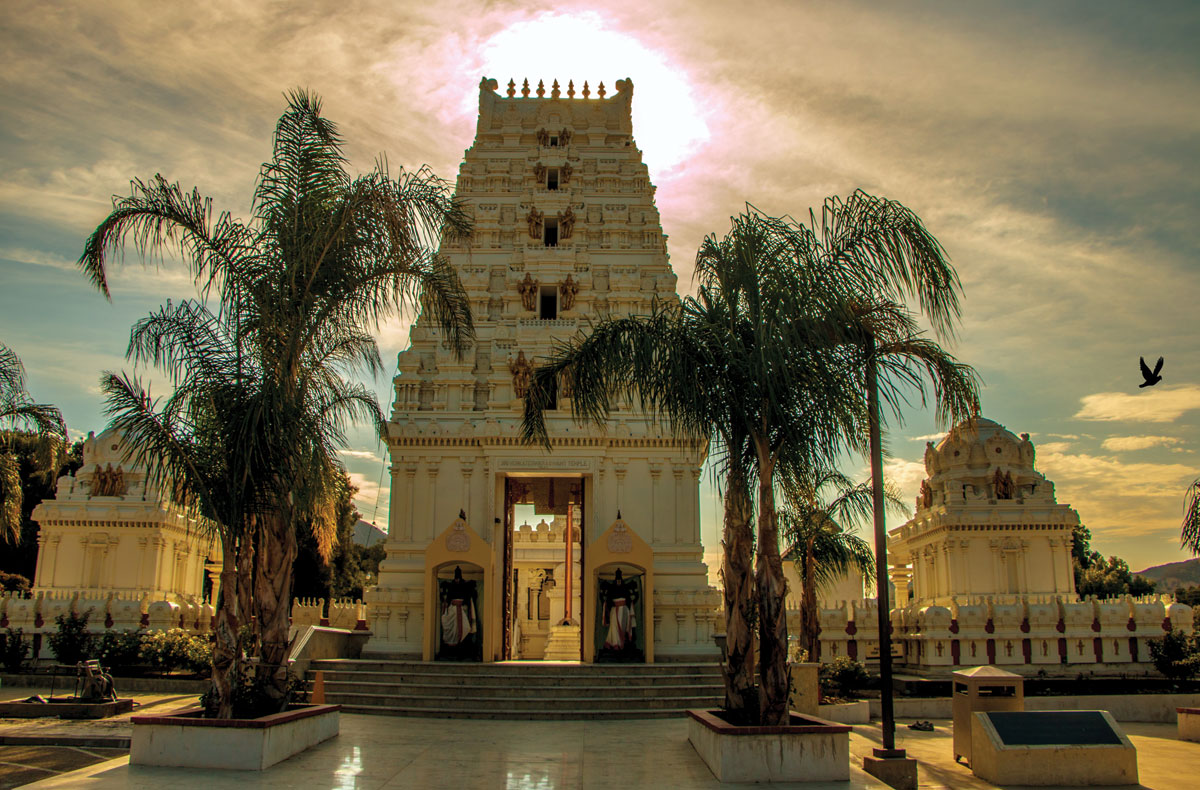A BRIGHT FUTURE
“No Bhagavata Purana story today,” said Grandpa Shivaram. A simple man, not particular about his clothes or his unkempt hair, Shivaram, a retired physician, looked older than his age. Children affectionately called him, “Dada,” in Hindi. – @Siliconeer #Siliconeer #Fiction #DrRaghavendraRao #Literature
As usual, Shivaram Dada sat on a mat in the verandah of the temple and conversed with children. Every Sunday morning, as the sun rose, he came to the temple, circumambulated the idols of various gods and goddesses, chatted with the priest, graciously received the thirtha, the holy water, passed his wet palm over his head, and settled in the hall. Soon, children of all ages arrived and sat around him to listen to his stories from puranas. He had a knack for telling the episodes sprinkled with moral values which came deep from his heart out of total conviction. The children listened attentively. Often, several adults joined the group as well.
“O, Dada, no Bhagavata story today? Darn,” the children grumbled.
“All right, I’ll tell you a story. Listen carefully.”
“It was an average sized town in America. People came there from various parts of India and settled down and prospered. They were doctors, engineers and entrepreneurs. Soon they had children, they grew up, attended schools and started asking all sorts of questions about their religion, rituals and traditions. Parents did not know how to answer them and became perceptibly concerned. They met, and after some deliberations, decided to build a temple and hire a priest because they thought this would help to alleviate their children’s doubts. They started collecting donations and bought five acres of land on outskirts of the town. They elected seven members to a board of directors and voted Dr. Venkatesh, a neurosurgeon, as the president and chose other officers.”
“One auspicious day, the committee members met on the desert land where the future temple was to be built.”
“‘We shall build a beautiful temple here. The main entrance should be as tall as that of Balaji’s temple in India. Oh, this will be fantastic!’ The president, Venkatesh said enthusiastically.”
“’By the way, who will be the main deity of the temple?’ Rama Rao, the secretary asked.”
“’I told you, God Balaji.’”
“’Well, we didn’t even have a meeting involving all the donors. You can’t decide just like that.
Actually, I was thinking of Goddess Meenakshi as the main deity for this temple. There are hardly any temples for the Goddess in this country,’” opined Rama Rao.
“’Why can’t we have Lord Ganesh instead? He removes obstacles and already we are having differences.’ said Gopal, the treasurer.”
“’No.’” The president said curtly.”
“’Why not?’”
“’Have you heard of ten main Gods in one temple in India? That’s not the way it’s done.’ The president raised his voice.”
“Soon a heated discussion ensued. Finally, the president said, ‘I have promised to pay a lion’s share for this land with the explicit understanding that my opinion will be honored. It must be Balaji’s temple here. If you people disagree with me, I’ll resign and take back my money.’”
“’You will not get a penny back. The deed is in escrow and this land belongs to the temple,” retorted the secretary.”
“’How dare you say that?’ shouted the president. He caught hold of the secretary’s necktie and yanked it. The secretary, much younger than the president, punched him on the nose. The president fell in the dust, got up, and wiping his bleeding nose he bellowed, ‘I will drag you to the court for assaulting me, then for my money.’ Shaking with rage, he jumped into his Mercedes, and raising dust clouds on the desert road, sped off.”
“The cacti and the lizards on the land silently watched the show.”
Shivaram fell silent.
“Dada, then what happened? Did the president change his mind? Did they build a temple?
Where did this happen?” Nalini, a high school student asked.
“Nalini, since the escrow was not closed, the president got his deposit back. The committee dissolved and all activities ceased. Did they build the temple later? Yes. Actually, you are sitting in the verandah of the temple. We should have been role models. Instead, we fought. What would children have thought of us? We were ashamed. Finally, it dawned on us that temples are for mutual cooperation and cultural unity, to love and respect each other, but not for creating divisions among us in the name of religion.”
“After several years, things changed. More Indians came to this town. We formed another committee, collected money and bought the same land. We built this temple and placed deities of all Gods, Goddesses and religious sages as well, which satisfied the Indian diaspora here.”
“Dada, what happened to the lizards?” Reyva, a kindergartener asked.
“Oh, they are still here. We gave them a cleaning job. Often, you see them at the temple corners gobbling up insects.”
Anish, a 12th grader got up. “Shivaram Dada, I have a suggestion. You people were generous installing all deities to satisfy the various religious beliefs of Hindus. Now, you have four acres of empty land surrounding this temple. Why don’t you invite Christians, Jews and other spiritual faiths to build a church, a synagogue on this empty land? This will create better understanding of our culture and create harmony among all the people of this town.”
“Come here, Anish,” said Shivaram Dada. He hugged him. “Anish, what a beautiful idea! I may not see this happen in my life, but this kind of future awaits you. Please strive for it. My blessings.”


